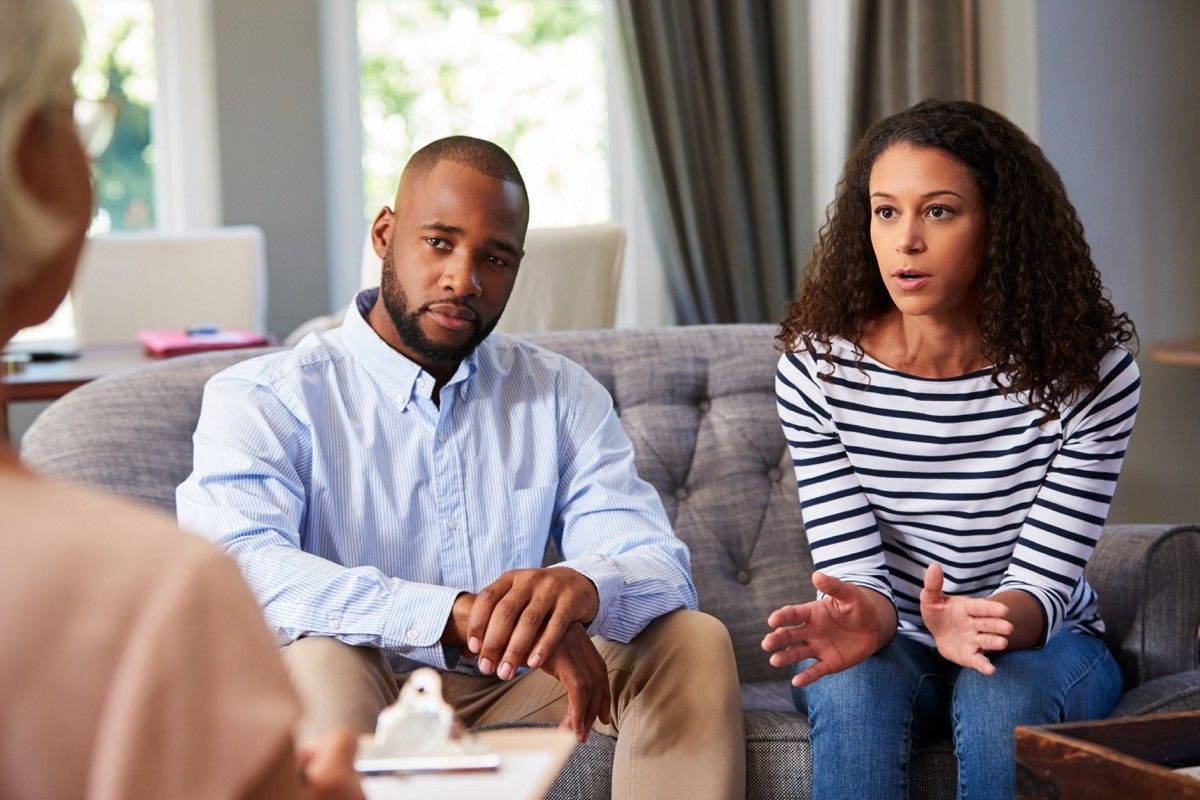The No. 1 Way to Save Your Marriage After Infidelity, Therapists Say

You might face many challenges in your marriage, from financial woes and miscommunications to differing sex drives and clashing views on raising the kids. But arguably the most devastating blow you can experience in a partnership is infidelity. In some cases, such a betrayal of trust could lead to immediate separation. In others, however, there’s a chance to recover the partnership—and sometimes even grow from the experience. If you’re interested in the latter, take note. Here, therapists tell us the number one way to save your marriage after one partner has strayed.
READ THIS NEXT: You’re 75 Percent More Likely to Divorce If You Have This, Data Shows.
How infidelity impacts a marriage.

Infidelity has enormous consequences on a relationship—for both the person who cheated and the person who was hurt. Those consequences can come in many forms. “Most commonly, it can create a sense of mistrust, problems with intimacy, and breakdowns in communication,” says Denise Fournier, LMHC, CCTP, a therapist at Evergreen Therapy. “The partner who was hurt by the infidelity may find it difficult to move on, as they might be plagued by thoughts, questions, and memories related to the infidelity, while the partner who was unfaithful may experience frustration over needing to rehash conversations or answer questions they’ve already addressed.”
Sometimes, this leads to an impasse. “The partner who was betrayed feels unable to move forward, even if they want to, and the partner who was unfaithful feels unsure about what they can do to make things better, other than continue apologizing,” says Fournier. The next steps you take are critical in determining if you’re able to move past the incident.
After infidelity, seek professional help.

Healing from infidelity can be nearly impossible to do alone—which is why several of the therapists we spoke to suggested seeking professional help. An experienced couples therapist can guide each member of the marriage to ask the right questions and organize their emotions. That starts with the person who did the cheating. “[They] need to recognize what drove the cheating, otherwise the fear is it can happen again,” says Diane Strachowski, a psychologist and relationship expert known as the Back To Love Doc. “What wasn’t working in the relationship, what got in the way of working on the marriage versus escaping into this other person?”
The victim of the affair can also benefit from therapy. “[They] need to have a safe space to also explore ways that the marriage wasn’t working,” says Strachowski. “There’s a technique called leveling, where the therapist shows that the relationship was not working for both people, so the victim feels like they have more agency.” Both partners can then agree that the marriage wasn’t as picture-perfect as they might have thought. They can then speak up for what they want moving forward. With an experienced, therapist, they’ll be able to do this in a fair, controlled, and healthy environment.
READ THIS NEXT: For more relationship advice delivered straight to your inbox, sign up for our daily newsletter.
Ask the right questions.

Some of the hardest parts of therapy will be getting into the nitty-gritty of the affair—and turning that information into something helpful. “The uninvolved partner has a lot of questions in order to make sense of the breach of trust,” says Stafanie Kuhn, a licensed marriage and family therapist who specializes in infidelity counseling. “I help couples to move from investigative questions to meaning-making questions.”
According to Kuhn, an investigative question might be something like: How did you meet? How long have you known them? How many times have you had sex? Where did you have sex? A meaning-making question would be something like: What did the affair mean to you? What was it like for you when you came home? Did you think of me or the kids? What did you get in the affair you didn’t have with me?
“This process will help the uninvolved partner understand on a deeper level what happened and will help with the shift to see what they might have contributed that let their partner have an affair,” says Kuhn. “In this phase, it is very important to help my client who is the hurt person to realize that it is not their fault—this is solely on the person who was involved and he/she needs to take full responsibility for their action—but where they need to grow as a couple to have a relationship they are both happy and satisfied with.” As you can see from the potentially triggering nature of both investigative and meaning-making questions, it’s best to undergo this process with a professional guide.
Remember that things don’t always work out.

Sometimes, it’s not possible to salvage a relationship after infidelity. And if that’s the case, a couples therapist can help ease the transition from partners to separated partners. “Not all therapy is geared to a couple staying together because some couples should not remain together,” says Frank Thewes, LCSW, therapist and owner of Path Forward Therapy. “Therapy can also provide structure and support during that process as well.”
READ THIS NEXT: If You and Your Spouse Do This Together, You’re 3.5 Times More Likely to Divorce.